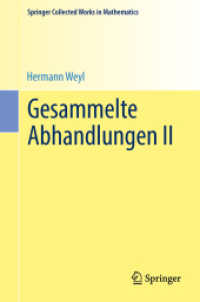基本説明
New in paperback. Hardcover was published in 2008. Examines recent cases including the break up of the Soviet Union, Yugoslavia and more.
Full Description
The issue of state succession continues to be a vital and complex focal point for public international lawyers, yet it has remained strangely resistant to effective articulation. The formative period in this respect was that of decolonization which marked for many the time when international law came of age and when the promises of the UN Charter would be realized in an international community of sovereign peoples. Throughout the 1990s a series of territorial adjustments placed succession once again at the centre of international legal practice, in new contexts that went beyond the traditional model of decolonization: the disintegration of the Soviet Union, Yugoslavia, and Czechoslovakia, and the unifications of Germany and Yemen brought to light the fundamentally unresolved character of issues within the law of succession.
Why have attempts to codify the practice of succession met with so little success? Why has succession remained so problematic a feature of international law? This book argues that the answers to these questions lie in the political backdrop of decolonization and self-determination, and that the tensions and ambiguities that run throughout the law of succession can only be understood by looking at the historical relationship between discourses on state succession, decolonization, and imperialism within the framework of international law.
Contents
Introduction ; PART ONE: CRITICAL DIAGNOSTICS ; 1. What's Wrong with State Succession? ; 2. A Brief History ; 3. Succession, Identity and Continuity ; 4. The Ends of Succession ; PART TWO: CODIFICATION AND DECOLONIZATION ; 5. The Move to Codification ; 6. Initial Positions ; A) The ILC Sub-Committee ; B) The ILA ; 7. The Waldock Reports ; A) From Contract to Status ; B) New States ; C) Residual Categories ; D) Real Treaties ; 8. Final Moves: The Vienna Conference ; PART THREE: NEW BEGINNINGS, NEW ENDS ; 9. Beyond Decolonization: 1989 - ; 10. The Perils of Formalism ; 11. Treaty Continuity ; 12. Being Pragmatic? ; CONCLUSION








